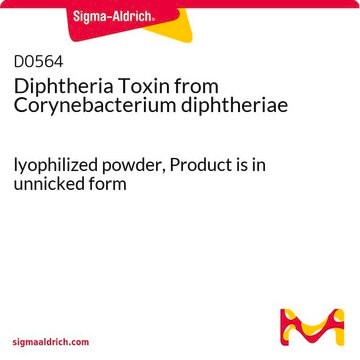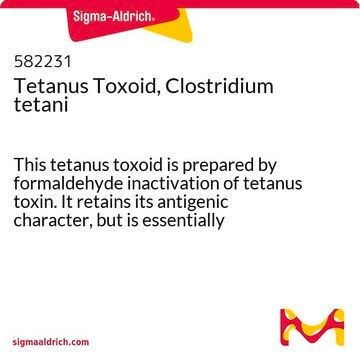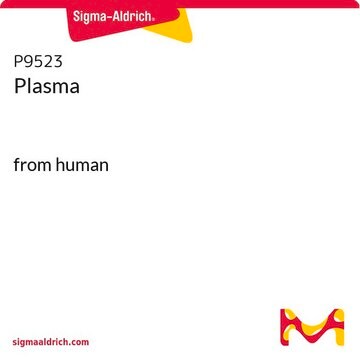推荐产品
無菌
sterile-filtered
品質等級
形狀
lyophilized powder
包裝
vial of 50 μg toxin (Also contains 10 mM Tris, 0.1 M NaCl, and 0.1% sucrose, pH 8.3.)
儲存溫度
−20°C
生化/生理作用
Pasteurella multocida toxin (PMT) is a bacterial protein toxin produced by few P. multocida serotype A and D strains. It acts as an effective mitogen in numerous cell types in vitro. PMT inhibits osteoblast differentiation by activating the Rho/Rho-associated coiled-coil containing protein kinase (Rho/ROCK) pathway. Infections of PMT cause atrophic rhinitis in pigs and by local dermatonecrosis, respiratory disease in cattle and rabbits. PMT is also a pathogenic agent of dermatonecrosis and bacteremia in humans.
特點和優勢
This compound is a featured product for Cyclic Nucleotide research. Click here to discover more featured Cyclic Nucleotide products. Learn more about bioactive small molecules for other areas of research at sigma.com/discover-bsm.
This compound is featured on the G Proteins (Heterotrimeric) page of the Handbook of Receptor Classification and Signal Transduction. To browse other handbook pages, click here.
儲存類別代碼
6.1A - Combustible acute toxic Cat. 1 and 2 / very toxic hazardous materials
水污染物質分類(WGK)
WGK 3
閃點(°F)
Not applicable
閃點(°C)
Not applicable
The Pasteurella multocida toxin is encoded within a lysogenic bacteriophage
Pullinger GD, et al.
Molecular Microbiology, 51(1), 255-269 (2004)
Pleiotropic effects of Pasteurella multocida toxin are mediated by Gq-dependent and-independent mechanisms involvement of Gq but not G11
Zywietz A, et al.
The Journal of biological chemistry, 276(6) (2001)
Regulation of osteoblast differentiation by Pasteurella multocida toxin (PMT): a role for Rho GTPase in bone formation
Harmey D, et al.
Journal of Bone and Mineral Research, 19(4), 661-670 (2004)
商品
Cyclic nucleotides like cAMP modulate cell function via PKA activation and ion channels.
我们的科学家团队拥有各种研究领域经验,包括生命科学、材料科学、化学合成、色谱、分析及许多其他领域.
联系技术服务部门






